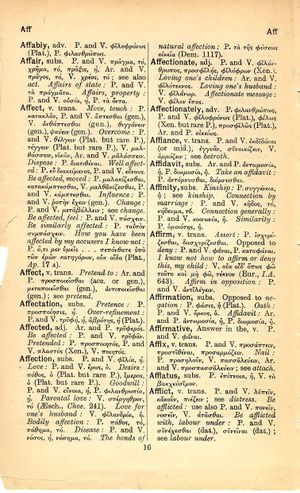afflatus
πάντες γὰρ οἱ λαβόντες μάχαιραν ἐν μαχαίρῃ ἀπολοῦνται → all they that take the sword shall perish with the sword
English > Greek (Woodhouse)
subs.
P. ἐπίπνοια, ἡ, V. τὸ βακχεύσιμον.
Latin > English (Lewis & Short)
afflātus: (adf-), a, um, Part., of afflo.
afflātus: (adf-), ūs, m. afflo.
I A blowing or breathing on, a breeze, blast, breath, etc., as of the wind, men, or animals: afflatusex terrā mentem ita movens ut, etc., Cic. Div. 2, 57, 117: adflatu nocent, by the effluvia, Ov. M. 7, 551: ambusti adflatu vaporis, Liv. 28, 23: ignes caelestes adussisse levi adflatu vestimenta, id. 39, 22: Favonii, Plin. 6, 17, 21, § 57: noxius, id. 4, 12, 26 al. —Of animals: frondes adflatibus (apri) ardent, by his breath, Ov. M. 8, 289: serpentis, Stat. Th. 5, 527: polypus adflatu terribili canes agebat, Plin. 9, 30, 48, § 92.—And of the aspiration in speech: Boeotii sine adflatu vocant collīs Tebas, i. e. without the h, Varr. R. R. 3, 1, 6.—
B Esp., a flash or glow of light (cf. afflo, I.): juncturae leni adflatu simulacra refovent, Plin. 36, 15, 22, § 98.—
II Fig., afflation of the divine spirit, inspiration: nemo vir magnus sine aliquo adflatu divino umquam fuit, Cic. N. D. 2, 66: sine inflammatione animorum et sine quodam adflatu quasi furoris, id. de Or. 2, 46.

